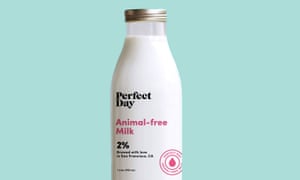After lab-grown meat, get ready for animal-free cow’s milk. A San-Francisco startup believes it has found a solution for the guilty conscience of consumers who love eating dairy ice-cream, cheese and yoghurt, but oppose factory-style farming and its environmental footprint.
Through a combination of yeast, cow DNA and plant nutrients, Perfect Day claims to have created a product identical in taste and nutritional value to cow’s milk, but without any udders involved.
Sales of milk alternatives such as soy, coconut, almond and more recently pea milk are expected to be worth more than $10bn by 2019. But until now they have not cut traditional milk and dairy production.
“The alternatives for yoghurt, cheese and ice-cream are so bad that people don’t even want to try them,” says Perfect Day co-founder Ryan Pandya. “Many have been switching to more plant-based diets but when you have to give up cheese you think ‘oh my god my life sucks I love pizza’. If you try to make cheese out of pea milk you will be sorely disappointed.”
The missing ingredient in plant-based alternatives is milk protein. To make the animal-free cow’s milk, Perfect Day insert cow DNA – which is readily available thanks to decades of research by the dairy industry – into yeast and add sugar to create milk proteins through fermentation. These milk proteins are then combined with sugar, fats and nutrients to create the final product.
“We’re taking plant nutrients and transforming them into animals proteins the same way that cows do, using the same milk proteins as found in cow’s milk, but much more efficiently, because we’re using a yeast cell not a 2,000lb animal,” said Pandya.
Although comparisons have been made with lab-grown meat, Pandya said they are not using novel technology. “Many people initially go ‘oh is this like lab or test-tube milk’, but that’s wrong. There are no test tubes in our fermentation process it’s just like brewing craft beer. The meat folks are trying to invent technology that doesn’t exist today, but our milk is made through techniques in use for more than three decades.”
While there is no sign yet of a commercial lab-grown meat product, Perfect Day said it plans to launch a cheese, yoghurt or ice-cream product by the end of 2017, with milk following later. It will be priced similar to organic dairy, but the company expects to quickly have a lower cost of production than milk.
The startup has already raised $4m from investors and been in talks, perhaps surprisingly, with a number of traditional dairy companies. “The assumption was that we’d be hated by the dairy industry but it’s actually the opposite. They see us as the long-term solution to problems they didn’t even know were solvable,” said Pandya.
Those problems include water pollution and climate change. The world’s quarter of a billion dairy cows are responsible for just under 3% of global greenhouse gas emissions. A study commissioned by Perfect Day found its animal-free milk uses approximately 24-84% lower energy use, 98% lower water use, 77-91% lower land use, and 35-65% lower emissions.
Rather than bringing to an end traditional dairy farming, Pandya expects their milk product to help negate the need for ever more intensive dairy farm systems. “We’re here to create another option for people. There is more and more demand for dairy and that is causing increasing factory farming. Everyone agrees we should do less of that and that’s something we’ll actually be able to do.”
However, it seems unlikely they will be able to call their new product cow or dairy milk.
A spokesperson for the US Food and Drug Administration said a product labelled as dairy milk needed to involve the “complete milking of one or more healthy cows”. If a food does not meet these standards then it must be labelled “with a common or usual name or an appropriately descriptive term, and the labelling must be truthful and not misleading”.

